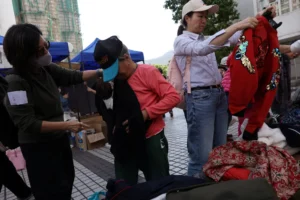
Recent revelations have ignited widespread outrage over a Telegram group in which tens of thousands of people shared nonconsensual images and videos of women. Southern Metropolis Daily reported that the group, named “MaskPark Treehole Forum,” had at least 20 sub-channels and over 100,000 active members, all of whom were Chinese men. The forum hosted intimate and explicit images and videos of women who were secretly filmed in various locations, such as private bedrooms, public toilets, subway cars, hotel rooms, mall fitting rooms, and university campuses. The victims included current or ex-girlfriends, wives, daughters, mothers, colleagues, and classmates of the group’s members. Some content was exchanged for money, and some sub-channels provided subscribers with information on how to purchase and operate hidden cameras. Some content also contained the corresponding women’s contact information, as well as Deepfaked porn.
Hashtags related to the Telegram group attracted more than 270 million views on Chinese social media. But as Jessie Lau reported for The Guardian, the online discussion was eventually censored by authorities who appeared more interested in silencing the outrage than in stopping the abuse:
“The MaskPark incident exposes the extreme vulnerability of Chinese women in digital spaces,” Li Maizi, a prominent Chinese feminist now based in New York, told the Guardian.
“What’s even more insidious and shocking is the prevalence of perpetrators known to the victims: partners, boyfriends, even fathers committing sexual violence against underage girls.”
[…] For Li, the recent incident reveals a widespread tolerance and lack of meaningful law enforcement on the issue in China. Rather than tackling the proliferation of sexist and abusive content online, authorities appear more focused on detaining female writers of homoerotic fiction and censoring victims of digital abuse, she says.
“With the rise of deepfake technologies and rapid online circulation of surreptitiously filmed content, women’s bodies are being digitally exploited at an unprecedented scale,” Li [Maizi, a feminist activist] says. “But I believe if authorities are truly willing, and invest the necessary resources, it’s entirely possible to trace and prosecute these crimes. We need to hold the Chinese government accountable.” [Source]
Netizens registered their anger online. “A woman’s life is not a man’s erotic novel,” read one comment on Xiaohongshu. Another one read, “We are not…’content’ that can be randomly uploaded, viewed and fantasised about. We can no longer remain silent. Because next could be me, or it could be you.” CDT Chinese editors archived one WeChat article by 三月云 (Sānyuè yún, “March cloud”), which was later censored, that provided a detailed breakdown with screenshots from the Telegram group and an impassioned call for everyone to pay attention: “Women speaking out might not fix things overnight, but silence will only make it worse. Don’t despair. Don’t step back. Don’t give up.” Manya Koetse and Ruixin Zhang at What’s On Weibo described how censorship of the incident left many netizens dejected:
Another major issue fueling the whirlwind of emotion and anger on Chinese social media is the censorship of articles, comments, hashtags, and posts related to ‘Maskpark Gate.’ The story is being kept off trending search lists, and searching #maskpark# or #麦梓豪# (Mai Zihao[, one of the suspected organizers of the group]) on Weibo returns the message: “Sorry, this topic content cannot be displayed.”
[…I]nstead of being heard, they see their posts getting deleted—while seeing no progress in how the case is being handled.
“I’ve lost faith,” one user despairingly posted on Weibo “It feels like we’re stuck in a vicious cycle: anger, helplessness, forced forgetting, and then anger again. The harm has been done multiple times, but there’s been no progress.”
Others are beginning to feel a sense of apathy, questioning whether continuing to raise awareness even makes a difference. One Xiaohongshu user wrote: “We just endlessly pass along broken bits to those who already broke it into pieces. Eventually, there’s nothing left for us to break. Once it turns to dust, a gust of wind will blow it all away.” [Source]
Some commentators compared the Maskpark incident with South Korea’s “Nth room” scandal, where men blackmailed dozens of women into sharing sexually explicit images of themselves with tens of thousands of users on pay-per-view Telegram channels. But some netizens argued that the Maskpark scandal is worse. One Weibo post said, “Compared to the ‘Nth room’ incident, the evil of MaskPark is even more normalised and diffuse. There is no single principal offender and users share images for ‘pleasure’ not profit.” Moreover, while the South Korean government eventually prosecuted and sentenced the group’s ringleader to 40 years in prison, some Chinese commenters doubted whether their own government would be similarly motivated. Writing about the Maskpark incident for Sixth Tone, Jiang Xinyi described the challenges of pursuing justice in a Chinese legal environment stacked against the victims:
The case highlights the challenges of pursuing justice for crimes committed on overseas platforms, said Su Ruonan, a lawyer at Guangdong Tianlu Mengde Law Firm.
“Cross-border investigations rely on international judicial cooperation,” Su said. “The process is often lengthy and complicated, and can be affected by bilateral relations.”
[…] According to Su, China’s criminal law stipulates that those who secretly film or disseminate such content may face up to two years in prison if the case is deemed serious.
But Ding Jinkun, a lawyer at Shanghai DeBund Law Firm, told Fengmian News that this punishment only applies when the person uses equipment specifically modified for covert filming — not regular cameras.
In most cases, he said, those caught secretly recording others face at most 10 days of detention or a 500-yuan fine — even if the footage involves private body parts. Ding called the current penalties too lenient and urged that all forms of covert filming, regardless of the device used, be treated as criminal offenses. [Source]
Other recent examples of cyber-related violence against Chinese women have also generated intense social media discussion before being censored. Last month, a Dalian Polytechnic student was doxxed and attacked online by Chinese media and nationalists after a foreign man shared intimate videos of their encounter without her consent. This spring, a Chinese student in the U.K. was convicted of raping dozens of women, after police discovered he had filmed at least nine of his attacks with hidden cameras. For other examples, see this series of essays on the topic of countering cyberbullying against women, shared for International Women’s Day in 2023.
Meanwhile, Chinese authorities across the country have unleashed a new crackdown on women writers of Boys Love, or danmei, a genre of online homoerotic fiction. This has led to the censorship and arrest of at least 30 writers, many of whom wrote for a foreign-based platform and were charged under criminal laws related to pornography. Some received sentences of four to five years in prison.





